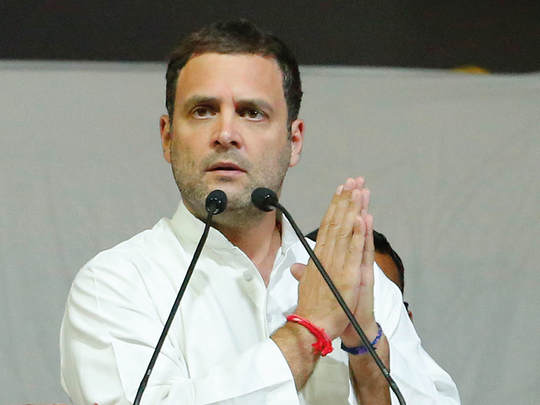The real reason for the Congress’ opposition to the consecration ceremony of the Shri Ram Temple in Ayodhya is that it has always wanted to maintain its dominance over the politics of temples and mosques. It is accusing Prime Minister Narendra Modi and the BJP of politicizing the temple issue, while it is the Congress leaders themselves who have been using various platforms, organizations, and governments on the Ayodhya issue since 1986.
It can be confirmed from documents, not just by journalists like us, that Prime Ministers and other Congress leaders, including Rajiv Gandhi, V.P. Singh, Chandrashekhar, and Narasimha Rao, used every possible means to keep the issue of temples and mosques alive. They negotiated with leaders of Hindu and Muslim organizations, used religious leaders, influential officials, famous journalists, and even the controversial “godman” Chandraswami for this purpose.
The most interesting thing is that the Congress, which is currently trying to play a leadership role in the I.N.D.I Alliance, has always considered one of its allies, the Shiv Sena of Uddhav Thackeray and Sanjay Raut, to be responsible for the demolition of the controversial structure (Babri Masjid) in Ayodhya in 1992. Yes, Sanjay Raut has also been claiming this with pride, citing the CBI charge-sheet.
The other ally, Sharad Pawar, the leader of the Nationalist Congress Party, has always been held responsible for the Mumbai riots of 1993. Rahul Gandhi and his close aides and advisors probably do not take the advice of older Congress leaders or do not want to listen to or understand their point of view. This is why they rejected the invitation to the Ram Mandir pran pratishtha ceremony to the Congress. This is why many regional leaders of the party have publicly expressed their disagreement with the decision.
The older leaders are aware that at the advice of Arun Nehru, Rajiv Gandhi opened the doors of the temple in 1986, so that he could gain the support of Hindu voters. Then, while being the party president and Prime Minister, Narasimha Rao kept trying to take the politics of the temple in his hands by letting the controversial structure fall. His associates, Bihar-Jharkhand leader Subodh Kant Sahay and Chandraswami, Naresh Chandra (officer advisor) were making political and administrative efforts to build a temple-mosque in 1993.
In fact, there were plans going on in the Prime Minister’s Office itself, so that the Congress could benefit in the Assembly and Lok Sabha elections. But many big sadhus and saints were not ready to consider Chandraswami as a saint. While holding his ministerial post, Subodh Kant Sahay conducted a Som Yagna in Ayodhya in June 1993. Then the process of forming a trust and the matter going to court continued.
Later, in the rule of Manmohan Singh, leaders like Kapil Sibal kept trying to stop the construction of the temple in court
However, Congress governments have been taking the help of RSS leaders from time to time. Documents also prove that top leaders like Mahatma Gandhi, Sardar Patel, Dr Zakir Hussain, Indira Gandhi, Narasimha Rao, and Jayaprakash Narayan took help from the RSS. Indira Gandhi imposed a ban on the RSS during Emergency, but publicly appreciated the assistance work of RSS volunteers during the India-China or Pakistan war. In Rajiv raj, Arun Nehru, Narayan Dutt Tiwari, and Narasimha Rao continued to have talks with RSS leaders on the temple issue.
Dr Zakir Hussain’s statement made on 20 November 1949, in a meeting in Munger, Bihar, can be mentioned regarding the Muslim community. Zakir Hussain said: “These allegations are completely baseless that the Rashtriya Swayamsevak Sangh harbours feelings of violence and hatred towards Muslims. Muslims should learn the lesson of mutual love, brotherhood, and organization from the Sangh.”
We have given this quote because some political or other organizations’ leaders and spokespersons criticise the Sangh by recalling the time when Guru Golwalkar was sarsanghchalak. Anyway, the Sangh and the BJP have changed themselves over time. Now, Prime Minister Narendra Modi is taking steps such as giving the benefits of his public welfare schemes to people of all religions, castes, and classes, giving women equal rights by abolishing the old divorce laws, and increasing the facilities for Haj pilgrims by signing an agreement with Saudi Arabia.
He is also making economic and strategic agreements with Islamic countries such as the United Arab Emirates, Iran, and Oman, as well as with the United States, Europe, and Russia. Communist parties have always received the most support from Russia, even during the Congress’ time in power or after. Now, the leaders and governments of those countries are praising the Modi government. In such a situation, can the Congress or its allies, such as Lalu Yadav and Sharad Pawar, or the communist parties, gain any electoral advantage by opposing the Modi government and the BJP on the temple-mosque issue?

